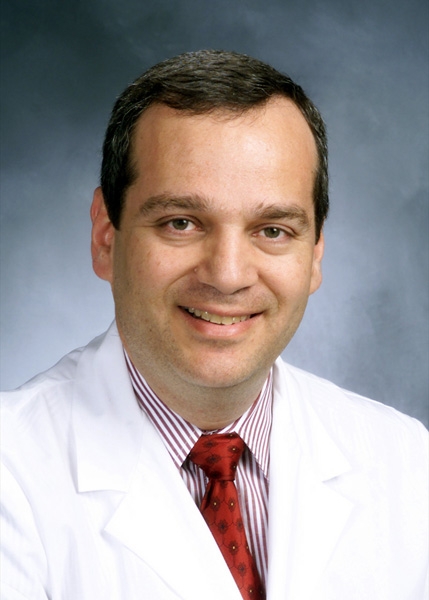
Dr. Andrew Talal
Top hepatologists and hepatitis C researchers gathered at Weill Cornell Medical College on Friday, Nov. 13, for the conference "Treatment of Hepatitis C Virus in Patients on Opiate Agonist Treatment."
The conference attracted prominent physicians and scientists from the fields of Hepatology, Infectious Diseases, Addiction Medicine, General Medicine, Epidemiology and Mental Health/Behavioral Sciences to discuss the obstacles in treating hepatitis C virus (HCV) in patients on Opiate Agonist Therapy (OAT), to review successful treatment models that have been used at different institutions throughout the United States, and to discuss strategies for overcoming obstacles to HCV treatment in this population.
The conference was co-chaired by Dr. Andrew Talal, associate professor of medicine at Weill Cornell's Center for the Study of Hepatitis C; and Dr. Alain Litwin, associate professor of clinical medicine and psychiatry at Albert Einstein College of Medicine/Montefiore Medical Center. Dr. Ira Jacobson, medical director of the Hepatitis C Center and the Vincent Astor Distinguished Professor of Medicine at Weill Cornell, emphasized the importance of integrating HCV evaluation and treatment into venues that offer substance abuse treatment. Strategies to integrate these two treatments are timely in light of an impending revolution in HCV treatment likely to occur in the next two years.
The conference opened with introductory comments from Dr. Mary Jeanne Kreek, the Patrick E. and Beatrice M. Haggerty Professor and head of the Laboratory of the Biology of Addictive Diseases at the Rockefeller University. Dr. Kreek noted that 1 million individuals in the United States are addicted to heroin and 250,000 people are in treatment with methadone. Epidemiologic studies have indicated that between 66 percent and 80 percent of heroin addicts are HCV seropositive. Up to 25 percent of heroin addicts are HIV-infected, and almost all of those with HIV also have HCV co-infection.
Next, Dr. David L. Thomas, chief of the Division of Infectious Diseases and the Stanhope Bayne Jones Professor of Medicine at Johns Hopkins University (JHU) School of Medicine, described methods to select patients in whom HCV treatment is indicated based upon the stage of fibrosis. Subsequent presentations reviewed barriers to successful engagement of HCV treatment in patients on OAT (Dr. Shruti Mehta, JHU); the French perspective on treatment of HCV in heroin addicts (Dr. Christian Trepo, Hôtel Dieu, Lyon, France); and a review of HCV treatment outcomes in American patients on OAT (Dr. Brandon Aden, WCMC).

Dr. Ira Jacobson
The second session of the conference reviewed programs that had successfully treated HCV in patients on OAT. Dr. Talal's program, "The Integrated Addiction Medicine: Hepatology Model for HCV Management Among Patients on Methadone Maintenance," was reviewed by Dr. Anthony Martinez, formerly of WCMC and presently at the University of California at San Diego. This program evaluated and treated HCV in approximately 400 patients from the WCMC Methadone Maintenance Treatment Program between 2006 and 2008. Dr. Talal and Dr. Ann Beeder, associate professor of clinical public health, were recipients of an award from the Clinton Global Initiatives, which provided support for their program. Drs. Litwin, Frederick Altice (Yale), R. Douglas Bruce (Yale), Brian Edlin (WCMC/SUNY Downstate), David Perlman (Beth Israel Medical Center in NYC), and Lynn Taylor (Brown) all presented promising data from their respective programs demonstrating that HCV can be effectively evaluated and treated in patients on OAT. Drs. Shiela Strauss (NYU) and Holly Hagan (NYU) presented evidence-based approaches to HCV education and prevention. Dr. Bret Fuller (University of Oregon Veterans Administration Medical Center) presented data on mental health and alcohol-related issues.
The last session of the conference, which focused on methods to overcome obstacles in the treatment of HCV in patients on OAT, was jointly moderated by Drs. Jacobson and David Fiellin (Yale). Drs. Henry Bodenheimer (Beth Israel Medical Center in NYC), Lawrence Brown (Addiction Research and Treatment Corporation), and Marc Gourevitch (NYU) discussed broader approaches for integration and co-localization of treatment for HCV and substance abuse. Dr. Jacobson discussed the potential for a treatment course that excludes interferon, an effective but highly toxic drug. "We are starting to dream of a final phase of interferon-free treatment," he said.
Hepatitis C affects roughly 5 million Americans. It is transmitted primarily through intravenous drug use and attacks the body's liver cells. In the absence of other factors, it could take as many as 30 years for hepatitis C to develop into end-stage liver disease, such as cirrhosis or liver cancer. But hepatitis C sufferers are almost always battling other life-threatening diseases.
Weill Cornell opened the Center for the Study in Hepatitis C in 2000. It is a cooperative research and treatment facility run by the Medical College, NewYork-Presbyterian Hospital and the Rockefeller University, and focused on improving the understanding of the biologic properties of the hepatitis C virus, the mechanisms by which it causes damage to the liver, and the identification of new research-based treatment for this disease.
